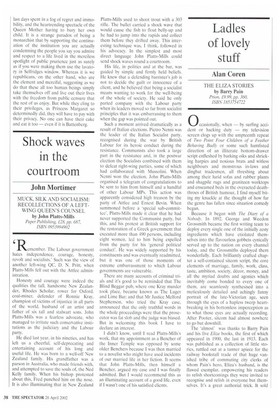Ladles of lovely stuff
Alan Coren
THE ELIZA STORIES by Barry Pain Prion, £9.99. pp. 360, ISBN 1853754722 0 ccasionally, when — by surfing accident or hacking duty — my television screen clogs up with the umpteenth repeat of Two Point Four Children of a Feather Behaving Badly or some such hamfisted direction of an illiterate bottom-drawer script enfleshed by barking oiks and shrieking harpies and noxious brats and witless neighbours and monstrous in-laws and dingbat tradesmen, all threshing about among their lurid sofas and rubber plants and shagpile rugs and graniteen worktops and enseamed beds in the overacted deaththroes of British humour, I find myself biting my knuckle at the thought of how far the genre has fallen since situation comedy began.
Because it began with The Diary of a Nobody. In 1892. George and Weedon Grossmith became the first writing team to deploy every single one of the initially zesty ingredients which have etiolated themselves into the flavourless gobbets cynically served up to the nation on every channel today, and the Grossmiths deployed them wonderfully. Each brilliantly crafted chapter a self-contained sitcom script, the core elements of marriage, family, work, class, taste, ambition, society, decor, money, and all the myriad doubts and agonies which inevitably come bonded to every one of them, are seamlessly synthesised into a meticulously detailed and achingly funny portrait of the late-Victorian age, seen through the eyes of a hapless twerp heartbreaking in his bottomless imperception as to what those eyes are actually recording. After Pooter, sitcom had almost nowhere to go but downhill.
The 'almost' was thanks to Barry Pain and his five Eliza books, the first of which appeared in 1900, the last in 1913. Each was published as a collection of little stories, rattled out at a tanner apiece for the railway bookstall trade of that huge vanished tribe of commuting city clerks of whom Pain's hero, Eliza's husband, is the flawed exemplar. empowering his readers to relish shortcomings they were invited to recognise and relish in everyone but themselves. It's a great authorial trick. It sold
cartloads. And the best part of the trick is that, although the clerking tribe itself has vanished, all the constituent elements, a century on, persist, just as true, and thankfully just as funny.
As funny as Pooter? Difficult to answer — that great benchmark of the pompous prat made lovable by the pathos of ineptitude, which fells him at every counter he tries to jump, casts a long shadow — but. just because I do find it difficult to answer, it doesn't really matter, because the difficulty itself means that The Eliza Stories are very funny indeed. Just as it doesn't really matter that Pain patently derives from Grossmith: when that derivation is so very close: the original stock is rich and thick and full of true comic flavour, and Pain's homage to the recipe ensures that whatever personal ingredients he adds only vary the delightful taste, never spoil it.
We stand indebted to Prion — who have already raised dozens of neglected humorous classics from their reject grave — that they are able to ladle out so generous a helping of this lovely stuff for under a tenner. Buy it, sup it, compare it to the watery tellygruel that has become our daily fare, and say a grateful grace.







































































 Previous page
Previous page